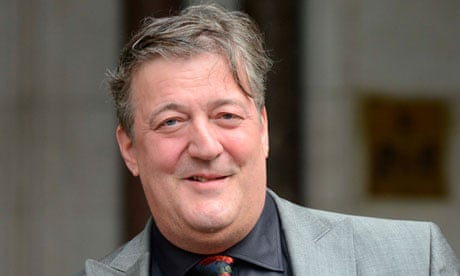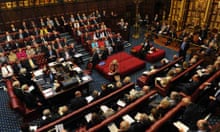Some of the Britain's most acclaimed authors and playwrights including Stephen Fry, Sir Tom Stoppard, William Boyd, Margaret Drabble, Ian McEwan and Sir Salman Rushdie have called on the main party leaders to honour their pledge and implement a defamation bill aimed at transforming 170-year-old laws they say have silenced scientists and authors as well as journalists and activists.
In an open letter, the authors tell David Cameron, Nick Clegg and Ed Miliband they are "deeply concerned" that the bill is going to be killed off after three years going through the legislative process simply because it had become entangled in a political row over the Leveson report on press regulation in the past month.
They said it was "entirely inappropriate, and even reckless, for libel reform to be sacrificed to the current political stalemate" in the letter, organised by the writers' lobby group English Pen.
Current British libel laws, the authors argue, have not changed substantially since 1843, have made London the libel capital of the world and are "not just a national disgrace" but an international concern. In 2010, the US president, Barack Obama, introduced laws in America to protect US citizens from British courts.
The signatories, who also include Julian Barnes, Claire Tomalin, Ali Smith, Dame Antonia Fraser, Sir David Hare, Susie Orbach and Michael Frayn, are concerned that improved libel laws are on the verge of collapse because of amendments inserted by Lord Puttnam into the bill in the past month during its final stage in the House of Lords.
The bill has been three years in the making and was included in the Conservative, Labour and Liberal Democrat manifestos. It did not touch on press regulation until last month, when a group of peers, frustrated by the lack of progress on the Leveson report among the political parties, won overwhelming support in the Lords to add sections to the bill covering a newspaper watchdog's activities.
Writer Gillian Slovo, daughter of the anti-apartheid leader Joe Slovo, told the Guardian: "It would be a terrible thing if the bill was killed, not because it isn't supported by all three parties, because it is, but because it became entangled in Leveson. It would be a great loss."
She said that "one of the great strengths of Britain was freedom of speech but its achilles heel is the libel laws which are mostly used to silence the less well-off".
Libel reform campaigners including Lord Lester, believe it can be salvaged but only if it gets on to Commons business by the middle of March. Political sources have confirmed it is not currently slated for discussion and will not be while Leveson talks continue, raising fears the bill is already dead.
Boyd, vice-president of English Pen, said Puttnam's amendments had "nothing to do with the principle of libel reforms, whose validity had already been established" through consultation and debate in three parliamentary committees.
The amendments include proposals for a new arbitration unit to resolve disputes with newspapers and an incentive system that would mean publishers who did not sign up to the new press regulator could face punitive damages and costs in high court libel actions.
The authors say that a number of scientists have faced "ruinous libel suits simply for blowing the whistle on dangerous medical practices" in the past three years . If the defamation bill became law, the risk of libel action would be lessened because of a new public interest defence. Big corporations such as drugs companies would also have to prove serious financial harm before they could take action.
"If the law is not reformed, bullies will continue to be able to prevent the publication of stories that are often not only in the public interest, but a matter of public health and safety," the letter says.
Other signatories are Lisa Appignanesi, Jake Arnott, Amanda Craig, Victoria Glendinning, Mark Haddon, Ronald Harwood, Michael Holroyd, Howard Jacobson, Hisham Matar, Philippe Sands, Will Self, Kamila Shamsie and Raleigh Trevelyan.
Downing Street said it supported the bill but said it was stymied as long as the Puttnam amendments remained. "The government is strongly behind the objectives of the original defamation bill. The government does not support the Puttnam amendments and is clear the Puttnam amendments will not make it onto statute," said a spokesman for No 10.
A Labour spokesperson said: "Labour's commitment to modernising our outdated defamation laws can be seen in the sheer effort we've put into knocking into shape an original set of proposals that really weren't up to the mark. It would be an outrage if the government prevented parliament from having its say given how much work has gone into proposals that give our defamation laws a much-need updating."
Full text of the open letter
We are writing to urge you to fulfil your commitment to libel reform and ensure that the defamation bill is passed.
All three parties made a pledge in their manifestos and this was restated in the government's coalition agreement.
We are deeply concerned that the bill is currently under threat, following the insertion of a new clause, late in the legislative process, which introduced aspects of Lord Justice Leveson's recommendations. The defamation bill is not a suitable vehicle for the wider proposals of press regulation – as Lord Justice Leveson himself noted, libel did not form part of his terms of reference. It is therefore entirely inappropriate, and even reckless, for libel reform to be sacrificed to the current political stalemate. The bill offers an opportunity for reform that we cannot afford to miss.
This is a citizens' bill that has the support of scientists, consumer groups, lawyers, doctors, journalists, writers and bloggers – more than 60,000 individuals have signed the Libel Reform Campaign's petition for reform. This rare consensus across society springs from the knowledge that the libel laws of England and Wales may chill the speech of anyone who has the courage to speak out in the public interest.
Since the campaign for libel reform began three years ago, you will be aware of the many cases of scientists who have faced ruinous libel suits simply for blowing the whistle on dangerous medical practices, of writers whose investigations in the public interest cannot be published in the UK for fear of an action and consumer forums who face threatening letters from claimant lawyers for exposing poor practice. If the law is not reformed, bullies will continue to be able to prevent the publication of stories that are often not only in the public interest, but a matter of public health and safety.
Our libel laws are not just a national disgrace, but an international concern. The UN human rights committee singled the UK out for the impact of libel on freedom of expression; the USA has introduced legislation to protect its citizens from our libel courts.
The defamation bill promises to bring libel law into the 21st century by providing effective defences for online publication, it will stop corporations from bullying individuals into silence, put an end to trivial and vexatious claims, and introduce a long overdue public interest defence.
This is an historic moment for free speech in this country. As writers and members of English Pen, we ask you to honour your commitment and ensure that the bill completes its passage by the end of this session of parliament.
Lisa Appignanesi, Jake Arnott, Julian Barnes, William Boyd, Amanda Craig, Margaret Drabble, Antonia Fraser, Michael Frayn, Stephen Fry, Victoria Glendinning, Mark Haddon, David Hare, Ronald Harwood, Michael Holroyd, Howard Jacobson, Hisham Matar, Ian McEwan, Susie Orbach, Salman Rushdie, Philippe Sands, Will Self, Kamila Shamsie, Gillian Slovo, Ali Smith, Tom Stoppard, Claire Tomalin, Raleigh Trevelyan



Comments (…)
Sign in or create your Guardian account to join the discussion